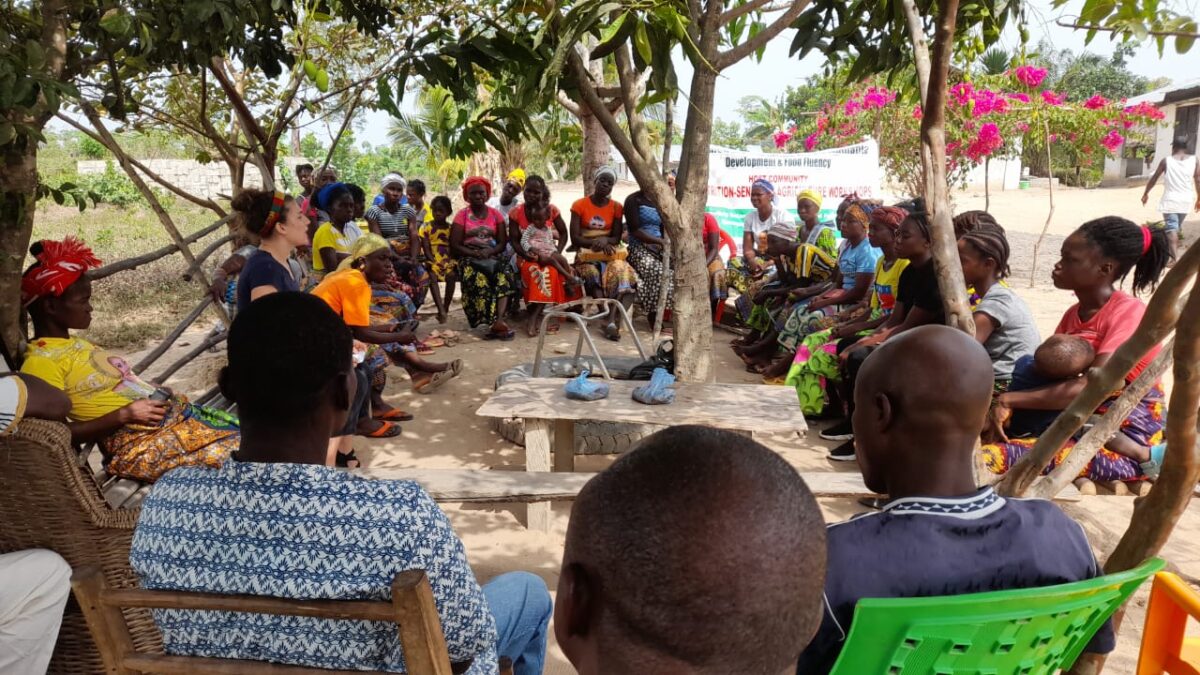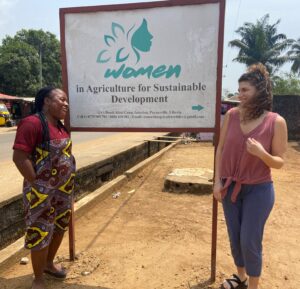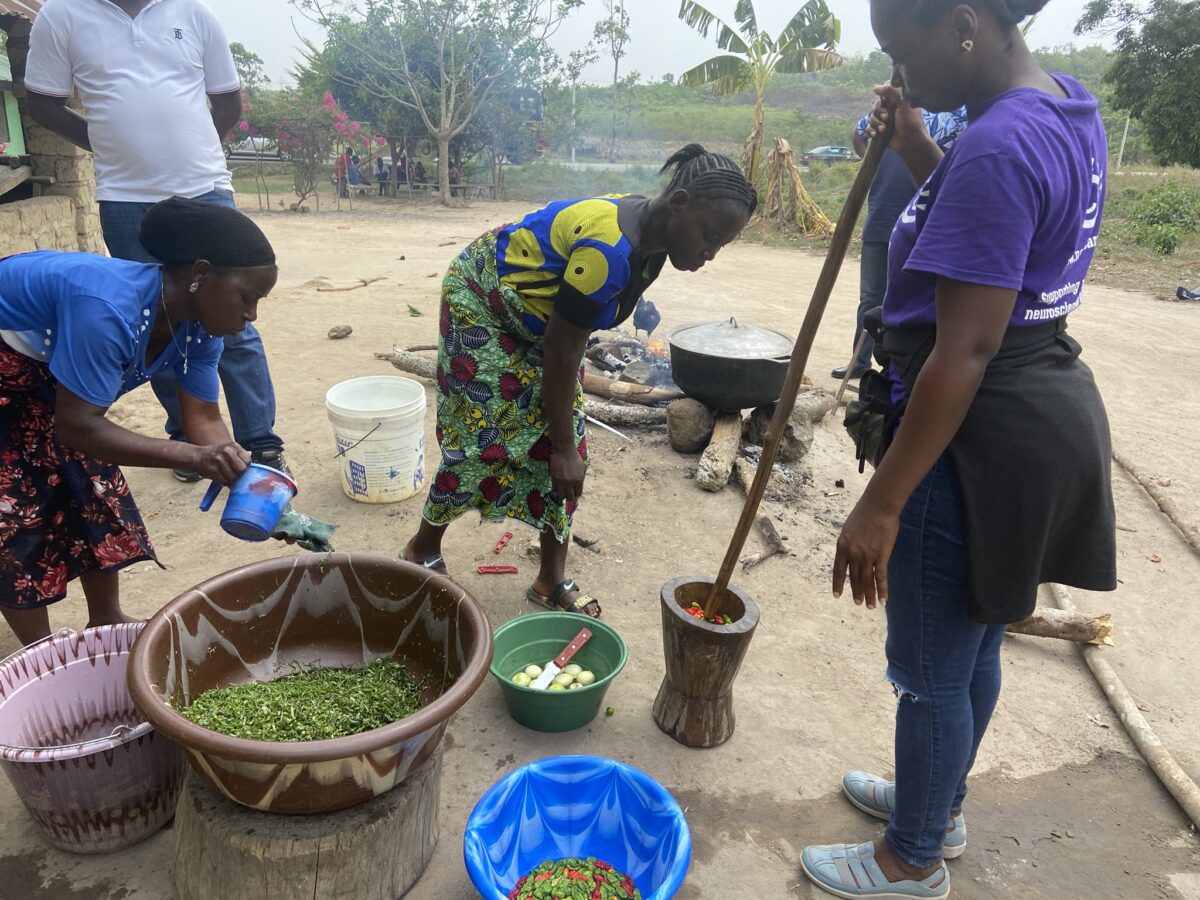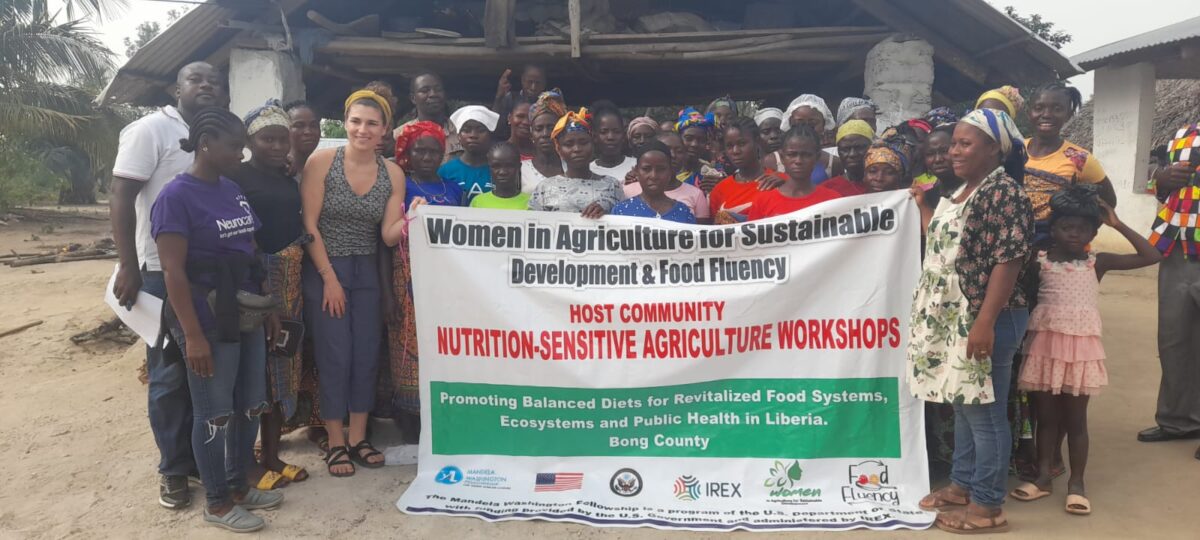Promoting Better Nutrition and Sustainability Through Adaptive Design
One of the best things we can do for our own health and those around us (including nature’s) is to be informed about the food we eat … while still taking baby steps towards our own version of a sustainable lifestyle… Balance is key.”
Michelle Gilman, 2022 Reciprocal Exchange Alumna, Massachusetts

Celebrated annually on May 28, World Nutrition Day increases awareness of nutritious foods and promotes informed dietary decisions that benefit both our own health and the environment. In spring 2023, Hawa Dunor-Varney, a 2022 Fellowship Alumna and rural development professional, collaborated with Michelle Gilman, an environmental nutrition specialist from Massachusetts, to implement a Reciprocal Exchange project in Bong County, Liberia.
Through their Women in Agriculture for Sustainable Development (WASUDEV) and Food Fluency program, they organized two workshops for 35 rural Liberian women farmers, which highlighted how food preparation can impact nutrition, showed the power that food has to promote health and wellness, and helped participants understand how they fit into a sustainable food ecosystem.
Using Food as Medicine to Combat Malnutrition
Hawa and Michelle first met through the Women Food and Agriculture Network and bonded over their shared passion for improving food security. But it was during Hawa’s 2022 Mandela Washington Fellowship, and her Leadership in Business Institute at Purdue University, that they had the opportunity to meet in person and formalized their partnership. They hoped to help people develop healthy eating habits through the consumption of locally produced crops and, in turn, to promote wellness and disease prevention in their respective communities.

“The Comprehensive Food Security and Nutrition Survey (CFSNS) of 2018 estimates that 35.5% of children [in Liberia] under five are stunted. Additionally, about 20% of households are consuming diets deprived of the most needed nutrients found in animal products, legumes, vegetables, and fruits,” says Hawa. “This is worrying, and I really think that it requires collective efforts to solve this problem.”
To begin devising the curriculum for their pilot project, Hawa and Michelle applied their mutual expertise to the local foods and dietary practices in Bong County. In preparation for their workshops, they conducted a Community Food System and Nutrition Assessment, including consulting local nutrition and agricultural professionals as well as focus groups to identify the specific nutritional and health needs of the rural community.
One of the key issues that Hawa and Michelle identified in the community was a Vitamin A deficiency, common in Liberia. Only 100 grams of Malabar spinach provide more than 200% of the average adult’s daily Vitamin A needs, but Michelle observed that the leafy green was typically cooked down for long periods of time, depleting most of its nutrients.

Through the workshops, they helped participants adapt how they prepared it to preserve its nutritional density while still appealing to local tastes and traditional cooking. One of the resulting dishes, which incorporated finely chopped raw Malabar spinach, was so well received that the participants requested second helpings!
The workshops also promoted dietary diversity and explored alternative ways of preparing other local dishes that would preserve the nutritional value of fresh foods. A representative from the country’s Ministry of Health and the Bong County Nutrition Officer participated in the project’s stakeholder meetings and workshops, respectively, and expressed their enthusiasm for the workshop’s model.
Promoting Environmental Sustainability through Food Systems
We need to understand that our lives are interconnected with each other and the ecosystem.”
Hawa Dunor-Varney, 2022 Fellowship Alumna, Liberia
In addition to promoting lifestyle changes, Hawa and Michelle also advocate for greater public awareness of local and global food systems. Through Food Fluency, they hope to emphasize the importance of intentionality in food purchasing habits, waste, and consumption, and educate people on the impact of food-related behaviors on the environment. “Food and nutrition are the most overlooked puzzle pieces to increase environmental sustainability,” Michelle says.

These workshops, piloted in Hawa’s home country of Liberia, have set the foundation for the Food Fluency program to be adapted in public schools in Michelle’s home state of Massachusetts. Since implementing their Reciprocal Exchange project, Hawa and Michelle have also made plans to expand the Food Fluency program by improving their digital design and planning for future campaigns, with the goal of enhancing their impact around the world.
If you’re interested in learning more, download the curriculum created by Hawa and Michelle for free at FoodFluency.org.
Written by Asheley Ashittey
Next Story
Ian Tarimo
2021 Leadership Impact Award Winner